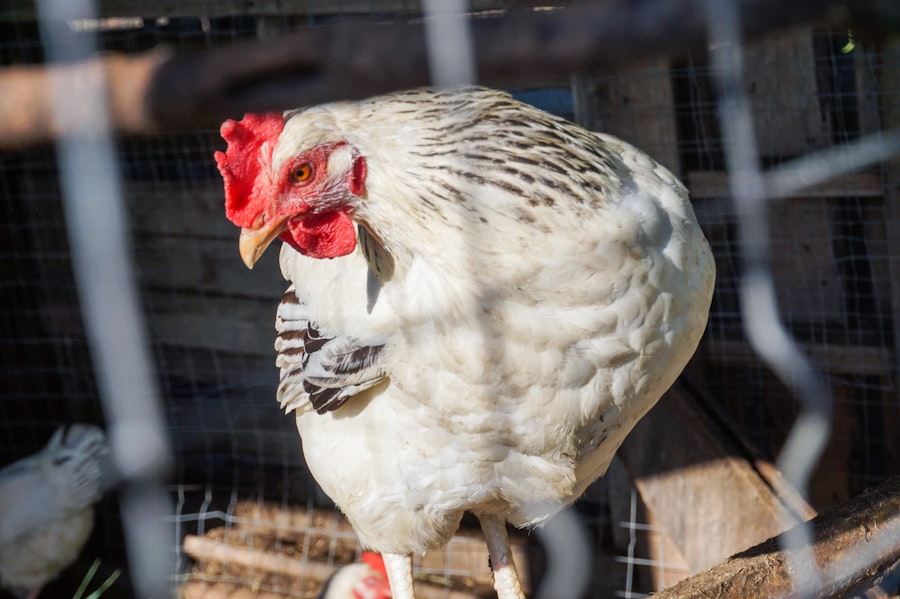Weasels are small, agile predators renowned for their cunning and stealthy hunting techniques. These opportunistic hunters prey on various small animals, including chickens, rabbits, and rodents. Weasels possess remarkable flexibility, enabling them to squeeze through tiny openings, and their excellent climbing abilities make them a significant threat to chicken coops.
One of the most notable characteristics of weasels is their tendency to engage in surplus killing, often taking down more prey than they can immediately consume. This behavior makes them particularly destructive to chicken populations. Their ferocity and tenacity during hunts are well-documented, as is their ability to access chicken coops through small gaps or from above.
The versatility and persistence of weasels as predators pose significant challenges for chicken owners. Their capacity to enter coops through various means, combined with their skilled climbing abilities, makes them a formidable threat to poultry. Understanding these predatory behaviors is essential for developing effective strategies to protect chicken coops from weasel attacks.
Table of Contents
- 1 Securing the Chicken Coop: Fortifying the Perimeter
- 2 Implementing Deterrents: Natural and Artificial Methods
- 3 Utilizing Guardian Animals: Dogs and Geese as Weasel Deterrents
- 4 Maintaining a Clean Environment: Removing Attractants and Hiding Places
- 5 Monitoring and Surveillance: Keeping an Eye on the Chicken Coop
- 6 Seeking Professional Help: Consulting with Wildlife Experts for Long-Term Solutions
- 7 FAQs
- 7.1 What are some signs that a weasel is targeting my chickens?
- 7.2 How can I keep weasels away from my chickens?
- 7.3 What should I do if I suspect a weasel is targeting my chickens?
- 7.4 Are there any natural deterrents for weasels?
- 7.5 Can I use chemical repellents to keep weasels away from my chickens?
Key Takeaways
- Weasels are predatory animals that pose a threat to chicken coops due to their hunting behavior.
- Fortifying the perimeter of the chicken coop is essential to prevent weasel intrusion.
- Natural and artificial deterrents can be implemented to discourage weasels from approaching the coop.
- Guardian animals such as dogs and geese can be used to deter weasels from attacking the chickens.
- Removing attractants and hiding places from the environment can help in keeping weasels away from the coop.
- Regular monitoring and surveillance of the chicken coop is necessary to detect any signs of weasel activity.
- Seeking professional help from wildlife experts can provide long-term solutions for managing weasel threats to the chicken coop.
Securing the Chicken Coop: Fortifying the Perimeter
Sealing All Openings
Securing the perimeter of the chicken coop is essential in protecting the chickens from weasel attacks. This can be achieved by using hardware cloth with small mesh sizes to cover all openings, including windows, vents, and gaps in the walls. It is important to ensure that there are no gaps or holes larger than 1/2 inch in diameter, as weasels can easily squeeze through small spaces.
Reinforcing the Coop
Additionally, reinforcing the coop with sturdy materials such as metal or heavy-duty wood can help prevent weasels from gaining entry. Another important aspect of fortifying the perimeter is to bury hardware cloth at least 12 inches into the ground around the coop to prevent weasels from digging underneath and gaining access from below. This underground barrier should also extend outward at an angle to further deter digging attempts.
Maintenance and Inspection
It is crucial to regularly inspect the perimeter for any signs of wear or damage and promptly repair any weak spots to maintain the integrity of the fortifications.
Implementing Deterrents: Natural and Artificial Methods

Implementing deterrents is an effective way to discourage weasels from targeting the chicken coop. Natural deterrents such as predator urine or feces can be strategically placed around the perimeter to create a hostile environment for weasels. Additionally, planting strong-smelling herbs and flowers such as lavender, mint, or marigolds can help repel weasels due to their strong scent.
These natural deterrents can be used in combination with artificial methods such as motion-activated lights or sound devices to startle and deter weasels from approaching the coop. Another effective artificial deterrent is the use of predator decoys such as fake owls or hawks, which can create the illusion of a threat and discourage weasels from entering the area. It is important to regularly move these decoys around to prevent weasels from becoming accustomed to their presence.
Implementing a combination of natural and artificial deterrents can create a hostile environment for weasels and reduce the likelihood of attacks on the chicken coop.
Utilizing Guardian Animals: Dogs and Geese as Weasel Deterrents
Utilizing guardian animals such as dogs and geese can provide an additional layer of protection for the chicken coop. Dogs are natural predators of weasels and can effectively deter them from approaching the coop. Breeds such as terriers or dachshunds are particularly adept at hunting weasels due to their size and agility.
Training a dog to patrol the perimeter of the coop and respond to any signs of weasel activity can significantly reduce the risk of attacks. Geese are also effective at deterring weasels due to their territorial nature and loud honking, which can alert chickens and other animals to the presence of a threat. Geese are known for their aggressive behavior towards intruders, making them a formidable deterrent against weasels.
Introducing a pair of geese to the vicinity of the chicken coop can provide an additional layer of protection and help keep weasels at bay.
Maintaining a Clean Environment: Removing Attractants and Hiding Places
Maintaining a clean environment around the chicken coop is essential in reducing the risk of weasel attacks. Weasels are attracted to areas with abundant food sources and hiding places, making it important to remove any potential attractants such as spilled feed, fallen fruits, or unsecured garbage. Keeping the area around the coop free of debris and clutter can help eliminate potential hiding places for weasels and reduce the likelihood of them taking up residence nearby.
Regularly cleaning and maintaining the coop and its surroundings can help minimize potential attractants for weasels. This includes promptly removing any eggs laid outside of nesting boxes, as well as securing all food sources in tightly sealed containers to prevent attracting weasels and other predators. By maintaining a clean environment, chicken keepers can reduce the risk of weasel attacks and create a less hospitable environment for these cunning predators.
Monitoring and Surveillance: Keeping an Eye on the Chicken Coop

Install Security Measures
Regular monitoring and surveillance of the chicken coop is crucial in detecting any signs of weasel activity and preventing potential attacks. This can be achieved by installing security cameras around the perimeter of the coop to keep a constant watch on any potential threats. Additionally, setting up motion-activated lights or alarms can help alert chicken keepers to any nocturnal activity around the coop.
Conduct Regular Inspections
Regularly inspecting the perimeter for signs of weasel activity such as tracks, droppings, or burrows can provide valuable insight into potential threats and help chicken keepers take proactive measures to protect their flock.
Stay Vigilant and Proactive
By keeping a close eye on the chicken coop and its surroundings, chicken keepers can effectively detect and deter weasel activity before it escalates into an attack.
Seeking Professional Help: Consulting with Wildlife Experts for Long-Term Solutions
In some cases, seeking professional help from wildlife experts may be necessary to develop long-term solutions for protecting the chicken coop from weasel attacks. Wildlife experts can provide valuable insight into weasel behavior and habitat preferences, as well as offer guidance on implementing effective deterrents and fortifications. They can also provide advice on habitat modification and environmental management strategies to reduce the risk of weasel attacks.
Additionally, wildlife experts may be able to assist in trapping and relocating problem weasels that pose a persistent threat to the safety of the chicken coop. By consulting with professionals who specialize in wildlife management, chicken keepers can gain access to valuable resources and expertise that can help develop sustainable solutions for protecting their flock from weasel predation. In conclusion, understanding the predatory behavior of weasels is crucial in developing effective strategies to protect chicken coops from these cunning predators.
Securing the perimeter, implementing deterrents, utilizing guardian animals, maintaining a clean environment, monitoring and surveillance, and seeking professional help are all important aspects of protecting chicken coops from weasel attacks. By implementing these strategies in combination with one another, chicken keepers can effectively reduce the risk of weasel predation and create a safe environment for their flock.
If you’re looking for tips on how to keep a weasel away from your chickens, you may also be interested in learning about what to feed ducks. Check out this article on what you should feed ducks to ensure they stay healthy and happy in your backyard.
FAQs
What are some signs that a weasel is targeting my chickens?
Some signs that a weasel is targeting your chickens include missing or dead chickens with bite marks on the back of their necks, as well as evidence of a weasel entering the chicken coop, such as small holes or gaps in the fencing.
How can I keep weasels away from my chickens?
To keep weasels away from your chickens, you can use hardware cloth to secure the chicken coop and run, install motion-activated lights or sound devices, and keep the area around the coop free of tall grass and brush where weasels can hide.
What should I do if I suspect a weasel is targeting my chickens?
If you suspect a weasel is targeting your chickens, it’s important to take immediate action to protect your flock. This may include reinforcing the chicken coop and run, setting live traps, or contacting a professional pest control service for assistance.
Are there any natural deterrents for weasels?
Some natural deterrents for weasels include planting strong-smelling herbs and flowers around the chicken coop, such as lavender, mint, and marigolds. Additionally, some people have had success with using predator urine or hair from larger animals to deter weasels.
Can I use chemical repellents to keep weasels away from my chickens?
While there are chemical repellents available on the market, it’s important to use caution when using them around chickens, as some chemicals may be harmful to the birds. It’s best to explore natural and non-toxic deterrents first before considering chemical options.
Meet Walter, the feathered-friend fanatic of Florida! Nestled in the sunshine state, Walter struts through life with his feathered companions, clucking his way to happiness. With a coop that’s fancier than a five-star hotel, he’s the Don Juan of the chicken world. When he’s not teaching his hens to do the cha-cha, you’ll find him in a heated debate with his prized rooster, Sir Clucks-a-Lot. Walter’s poultry passion is no yolk; he’s the sunny-side-up guy you never knew you needed in your flock of friends!







